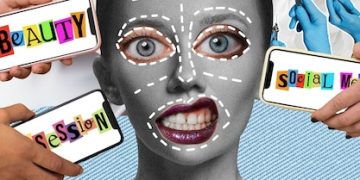Book Review Roundups: Future of Book Discovery in 2025 & Beyond

Book review roundups are anticipated to undergo significant transformations by 2025, leveraging AI and personalized algorithms to enhance book discovery, tailor reader experiences, and foster more engaging literary communities.
The landscape of book reviews is rapidly evolving. What will **book review roundups: the future of book discovery – predictions for 2025 and beyond** look like? Let’s explore.
The Rise of AI-Powered Book Discovery
Artificial intelligence is set to revolutionize how we discover new books. By 2025, AI algorithms will not only analyze book content but also understand reader preferences at a granular level.
Personalized Recommendations
AI will enable highly personalized recommendations based on reading history, preferred genres, and even emotional responses to previous books.
These recommendations will extend beyond simple genre matching, considering elements like writing style, character archetypes, and thematic elements.
Sentiment Analysis
Sentiment analysis will become a standard feature, allowing readers to gauge the emotional impact of a book before diving in.
- AI will scan reviews and social media discussions to identify key emotional themes.
- Readers can quickly assess if a book is uplifting, thought-provoking, or suspenseful.
- This ensures a better match between reader expectations and book content.
- Negative reviews will be assessed for patterns, helping authors improve future works.
Personalization and sentiment tools promise to make the book selection process more efficient and pleasurable.

Enhanced User Experience
The digital interface for book reviews will see a dramatic overhaul. Expect interactive elements, visual enhancements, and community-driven features.
Interactive Book Covers and Trailers
Imagine book covers that come alive, offering a sneak peek into the story with animations and sound effects.
Interactive book trailers will become commonplace, similar to movie trailers but tailored for literary works.
Virtual Book Clubs
Enhance book clubs through immersive virtual environments that allow members to interact with authors and characters in real-time.
- Virtual book clubs will host Q&A sessions with authors, streamed live to global audiences.
- Members can participate in interactive discussions and debates about the book’s themes.
- Virtual reality experiences will allow readers to step into the book’s world, enhancing their understanding of the story.
- Collaborative annotation tools will enable online book clubs to collectively analyze and interpret texts, fostering insightful discussions and shared understandings.
The user experience around book discovery will be much richer and more intuitive by 2025.
The Democratization of Book Reviews
Traditional book reviews, often confined to established publications, will give way to a more democratic landscape where every reader can contribute.
Micro-Reviews and Social Sharing
Platforms will encourage readers to share quick, impactful “micro-reviews” directly on their social media channels.
These micro-reviews will be easily shareable, creating viral marketing opportunities for authors and publishers.

Reader-Generated Content
Reader-generated content, such as fan theories, artwork, and playlists inspired by books, will be integrated directly into book review roundups.
- Dedicated sections for fan fiction will allow readers to expand upon the author’s original vision.
- Interactive maps will chart the locations mentioned in the novel, offering readers a chance to explore literary landscapes virtually.
- Reader-created playlists will accompany each book, providing an auditory experience tailored to the narrative’s mood and tone.
Giving every reader a voice will create a far more diverse and engaging book discovery experience.
The Impact of Blockchain on Book Reviews
Blockchain technology promises to bring transparency and trust to the world of book reviews. This can solve some of the historical issues with paid or biased reviews.
Verified Reviews
Blockchain can provide a tamper-proof record of reviews, ensuring that only genuine reader feedback is counted.
The immutability of blockchain ensures that reviews cannot be altered or deleted, preserving an honest reflection of reader sentiment.
Incentivized Reviews
Readers can be rewarded with cryptocurrency tokens for writing thoughtful, insightful reviews, further incentivizing quality feedback.
These tokens can be used to purchase books or other literary merchandise, creating a vibrant ecosystem of engagement.
Blockchain ensures that reviews are genuinely earned, providing publishers and authors with authentic feedback.
The Role of Augmented Reality (AR) in Book Discovery
Augmented Reality will play an increasing role in bringing book reviews to life. Imagine pointing your phone at a book and seeing reviews overlaid on the cover.
Interactive Overlays
AR apps will provide instant access to reviews, ratings, and related content simply by scanning a book’s cover.
- AR book covers will transform into interactive portals, offering a glimpse into the book’s world through animations and character introductions.
- Readers can use AR to access detailed character bios, plot summaries, and author interviews, enhancing their overall understanding of the book.
- AR-enabled book reviews will deliver personalized recommendations based on the reader’s past preferences and current reading habits.
- Interactive maps will overlay real-world locations with scenes from the book, allowing readers to experience the story in their own environments.
This seamlessly integrates the physical and digital worlds, enhancing the discovery process.
Staying Ethical in a Personalized World
As book review roundups become more personalized, concerns about echo chambers and algorithmic bias will grow. Maintaining ethical standards is crucial.
Transparency and Control
Readers should have clear insight into how recommendations are generated and have control over the algorithms that shape their book discovery experience.
Algorithms should consider a diverse range of perspectives to prevent the creation of echo chambers.
Human Oversight
Human editors and curators will remain essential to ensure the quality and diversity of book reviews. They can provide a critical eye that algorithms cannot replicate.
Editorial teams can curate collections of books that highlight diverse voices and perspectives, ensuring that readers are exposed to a broad range of literary experiences.
As we look to these future discoveries ethics will continue to be important.
The Future of Indie Authors and Book Review Roundups
Indie authors have always struggled to match the marketing spend of established publishing houses. Book review roundups are expected to level the playing field in the coming years.
Discoverability Tools
Platforms will emerge that provide indie authors with affordable tools to promote their books within relevant review roundups.
These tools provide marketing insights, helping indie authors to target their audience based on demographics or reader preferences.
Direct Engagement
Indie authors can directly interact with readers through Q&A sessions, book signings, and virtual events hosted within review platforms.
This direct access to readers helps foster a sense of loyalty and community, driving book sales and word-of-mouth marketing.
The future for indie authors is bright with a diverse range of venues for success.
| Key Point | Brief Description |
|---|---|
| 🤖 AI-Driven Discovery | AI will enhance book discovery with personalized, data-driven recommendations. |
| 🤝 Democratized Reviews | More platforms will allow readers to leave reviews creating more feedback. |
| 🛡️ Blockchain Trust | Blockchain technology will authenticate reviews removing paid biased content. |
| 👓 AR Integration | Augmented reality allows interactive elements such as AR book covers. |
Frequently Asked Questions
▼
AI can give personalized results by looking at your reading history, genres or emotions to find books you enjoy.
▼
Reviews will be impactful driving virality and marketing opportunities for authors and brands. Micro reviews will capture essential opinions.
▼
Blockchain technology verifies authentic book review content that can not be changed or altered after publishing for accuracy.
▼
By working on SEO optimized content. SEO content will lead to discoverability and ranking. Target demographics for the most impact.
▼
Algorithms will have to be monitored to ensure they are not biased or creating the wrong incentives. Human oversight is essential.
Conclusion
As we journey towards 2025, the future of book review roundups is bright with innovation, personalization, and inclusivity. By embracing AI, augmented reality, blockchain, and ethical practices, we can create a richer, more rewarding book discovery experience for readers and authors alike.





